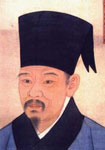
苏辙(1039—1112年),字子由,汉族,眉州眉山(今属四川)人。嘉祐二年(1057)与其兄苏轼同登进士科。神宗朝,为制置三司条例司属官。因反对王安石变法,出为河南推官。哲宗时,召为秘书省校书郎。元祐元年为右司谏,历官御史中丞、尚书右丞、门下侍郎因事忤哲宗及元丰诸臣,出知汝州,贬筠州、再谪雷州安置,移循州。徽宗立,徙永州、岳州复太中大夫,又降居许州,致仕。自号颍滨遗老。卒,谥文定。唐宋八大家之一,与父洵、兄轼齐名,合称三苏。 苏辙的古诗词
《次韵李曼朝散得郡西归留别二首》是苏辙在宋代创作的一首诗词。以下是对这首诗词的中文译文、诗意和赏析:
风波定后得西归,
After the wind and waves have calmed, I returned to the west,
鸟鹊喧呼里巷知。
Birds and magpies clamor in the streets and lanes, everyone knows.
未熟黄粱惊破梦,
The immature dream of Huangliang rice is shattered,
相看白发信乘危。
Looking at each other's white hair, we trust each other in times of danger.
豚肩尚有冬深味,
The taste of winter still lingers on the pork shoulder,
蚕器应逢市合时。
Silk-making tools should be used when the market is favorable.
父老为公留腊酒,
The elderly keep preserved wine for the public,
不须犹唱式微诗。
There is no need for elaborate and insignificant poems.
怀印徒行尚故衣,
Carrying the official seal, I walk alone in my old clothes,
邸中掾史见犹疑。
The clerks and historians in the mansion still hesitate to see me.
千人上冢乡关动,
Thousands of people ascend the tombs, the villages and passes are bustling,
五马行春雨泽随。
Five horses travel in the spring rain, leaving behind a trail of moisture.
醉里坠车初未觉,
Drunk and unaware of falling off the carriage,
道中破甑复谁悲。
On the road, the broken rice-steaming pot, who will mourn?
西行漫遣亲朋喜,
Leaving for the west, I casually bid farewell to relatives and friends with joy,
早赋陶翁归去诗。
Early on, I compose a poem to send off Tao Weng as he returns.
这首诗词表达了苏辙离别西归的心情和对时光流转的感慨。诗人在风波过后重返西归,周围的人们都知道他的归来。他触动了未熟的黄粱梦,意味着他扰乱了别人对美好幻想的期待,而相互间的信任则是建立在彼此白发斑斑的基础上。诗中还描绘了一些生活细节,如冬天仍能品尝到冬天的味道、蚕器应该在市场繁忙时使用、父老为公留佳酿等。作者以自嘲的口吻提到自己身上的印章和旧衣服,表现出他离开官场后的自由自在。最后,诗人以轻松的心情送别了归去的陶渊明,寄托了自己对他的崇敬和祝福。
整首诗词以平易近人的语言表达了作者的情感和对生活的思考,展现了苏辙在离职后的豁达和淡泊态度,以及对友谊和人生的真挚关怀。
cì yùn lǐ màn cháo sàn dé jùn xī guī liú bié èr shǒu
次韵李曼朝散得郡西归留别二首
fēng bō dìng hòu dé xī guī, niǎo què xuān hū lǐ xiàng zhī.
风波定后得西归,鸟鹊喧呼里巷知。
wèi shú huáng liáng jīng pò mèng, xiāng kàn bái fà xìn chéng wēi.
未熟黄粱惊破梦,相看白发信乘危。
tún jiān shàng yǒu dōng shēn wèi, cán qì yīng féng shì hé shí.
豚肩尚有冬深味,蚕器应逢市合时。
fù lǎo wèi gōng liú là jiǔ, bù xū yóu chàng shì wēi shī.
父老为公留腊酒,不须犹唱式微诗。
huái yìn tú xíng shàng gù yī, dǐ zhōng yuàn shǐ jiàn yóu yí.
怀印徒行尚故衣,邸中掾史见犹疑。
qiān rén shàng zhǒng xiāng guān dòng, wǔ mǎ xíng chūn yǔ zé suí.
千人上冢乡关动,五马行春雨泽随。
zuì lǐ zhuì chē chū wèi jué, dào zhōng pò zèng fù shuí bēi.
醉里坠车初未觉,道中破甑复谁悲。
xī xíng màn qiǎn qīn péng xǐ, zǎo fù táo wēng guī qù shī.
西行漫遣亲朋喜,早赋陶翁归去诗。
